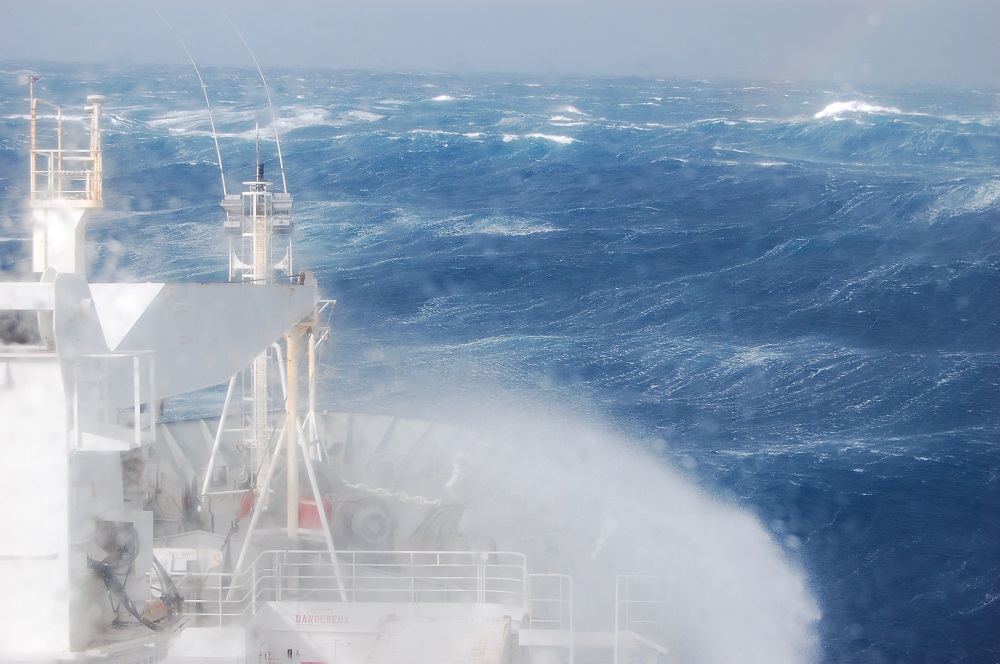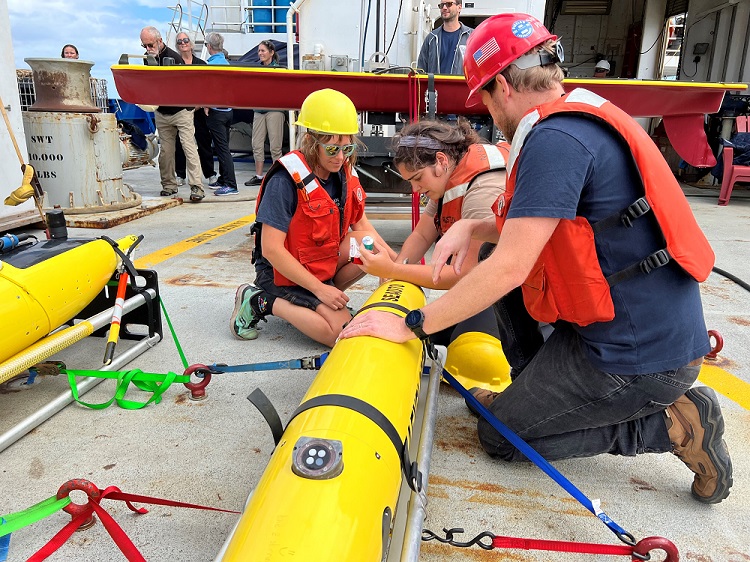WHIRLS: Small ocean eddies with a major impact on climate and marine life
An international research team has been awarded an ERC Synergy grant for an interdisciplinary project focusing on the ocean’s role in climate.
Small-scale ocean dynamics play an important role in the exchange of heat and carbon between the ocean and the atmosphere. It influences the ocean’s ability to mitigate climate change, as well as the way in which the ocean is affected by it. Funded by the European Research Council (ERC), the WHIRLS project focuses on these small-scale physical processes and explores their impact on climate, marine biogeochemistry and biodiversity. Oceanographers specialising in modelling from Germany, France, Sweden and South Africa will work together to improve our understanding of these processes so that we can improve our ability to predict future changes in our oceans and climate.
It is vital to resolve small-scale processes in climate models, thereby improving their accuracy in order to better predict climate change and develop appropriate mitigation and adaptation solutions. Sabrina Speich, professor and project leader at ENS-PSL/LMD-IPSL Paris.
Heat and carbon play a crucial role in regulating regional and global climate. The ocean absorbs large quantities of heat, limiting the effects of global warming. When it releases this heat into the atmosphere, the climate becomes warmer and wetter, and vice versa. The carbon that enters the ocean is transported by ocean currents and absorbed by phytoplankton, tiny plants that form the basis of the marine food chain and are essential for ocean biodiversity. The carbon thus absorbed by the ocean remains there for centuries, helping to reduce the concentration of atmospheric greenhouse gases and mitigate climate change.

Le NO Français Marion Dufresne II opérant dans l’océan au sud-ouest de l’Afrique lors d’une campagne de recherche menée par le Prof. S. Speich. Crédit : S. Speich, LMD et ENS
The exchange of heat and carbon between the ocean and the atmosphere, and their distribution in the ocean, are governed by vast ocean currents, as well as small eddies and filaments. The WHIRLS project, funded by a prestigious Synergy grant from the European Research Council (ERC), will look at these small-scale processes. Professors Sabrina Speich from the École normale supérieure in Paris, Arne Biastoch from the GEOMAR Helmholtz Centre for Ocean Research in Kiel (Germany), Sebastiaan Swart from the University of Gothenburg (Sweden) and Sarah Fawcett from the University of Cape Town (South Africa) will work together to develop a new scientific approach. The WHIRLS project will receive funding of almost 12 million euros over a six-year period.
“WHIRLS focuses mainly on small-scale processes that have a significant impact on large scales,” explains Sabrina Speich, a physical oceanographer at the ENS’s Dynamic Meteorology Laboratory. Eddies are phenomena that occur on scales of less than 100 kilometres. Although they may seem insignificant, these processes play a major role in the context of the global ocean, and they are currently poorly understood in ocean observations and climate models.
The project will exploit the most advanced observation technologies, including measurements from ships, the use of robots and satellites. It will evolve from a two-dimensional perspective to a three-dimensional representation of all relevant physical and biogeochemical processes, taking into account time scales ranging from a few days to several seasons. WHIRLS will focus on observing, modelling and monitoring interactions between the atmosphere, the ocean surface and the deep ocean. It will examine processes that are still poorly understood, such as vertical mixing and the transfer of heat, nutrients and carbon in the ocean.

Un planeur robotisé sous-marin qui sera utilisé dans le cadre de WHIRLS sur le pont arrière du navire de recherche. Ces planeurs plongent à des profondeurs de 1 km toutes les 5 heures et effectuent des missions d’une durée de 6 à 12 mois. Ils mesurent des propriétés essentielles telles que les courants océaniques, la température, la salinité, la chlorophylle et l’oxygène. Crédit : Marcel du Plessis, Université de Göteborg.
The data collected will be used to develop and validate high-resolution models, thereby responding to the urgent need to represent processes on the kilometre scale in our models of the Earth system. The results obtained will be used to improve numerical weather forecasts and climate projections. The WHIRLS project is part of the United Nations Decade of Ocean Sciences for Sustainable Development, contributing to both European and international scientific priorities.
The research will focus on the world’s most energetic region, the Agulhas Current system around South Africa. This system of currents is exceptional because of its vigorous circulation, the very intense exchanges of heat and carbon between the ocean and the atmosphere, and the exceptional diversity of its marine ecosystem. It also plays a central role in global ocean circulation and in regional and global climate.
More
European Research Council (ERC)
The European Research Council (ERC), created by the European Union in 2007, is Europe’s leading funding body for excellence in frontier research. It funds creative researchers of all nationalities and ages to carry out projects across Europe. The ERC offers four basic grant programmes: Start-up Grants (for scientists who have recently obtained their doctorate), Consolidation Grants (for scientists in the middle stages of their career), Advanced Grants (for experienced scientists) and Synergy Grants (for projects that require the combined expertise of several scientists from different fields).
Synergy” grants support cooperation between principal investigators to jointly solve ambitious research problems that could not be solved by principal investigators and their teams working alone. Projects enable substantial advances at the frontiers of knowledge, resulting for example from the cross-fertilisation of scientific fields, productive new lines of research, or new methods and techniques, including unconventional approaches and research at the interface between established disciplines. The ERC is run by an independent governing body, the Scientific Council. Maria Leptin has been the ERC President since 1 November 2021. The ERC’s overall budget for the period 2021-2027 is over €16 billion, as part of the Horizon Europe programme, under the responsibility of the European Commissioner for Innovation.
Links
- European Research Council (ERC)
- GEOMAR Research Unit Ocean Dynamics
- Laboratoire de Météorologie Dynamique, École Normale Supérieure
- Department of Marine Sciences, University of Gothenburg
- Polar Glider Research Lab, University of Gothenburg
- Oceanography Department, University of Cape Town
- Marine Biogeochemistry Lab, University of Cape Town
- GEOMAR Discover: Ocean Currents






